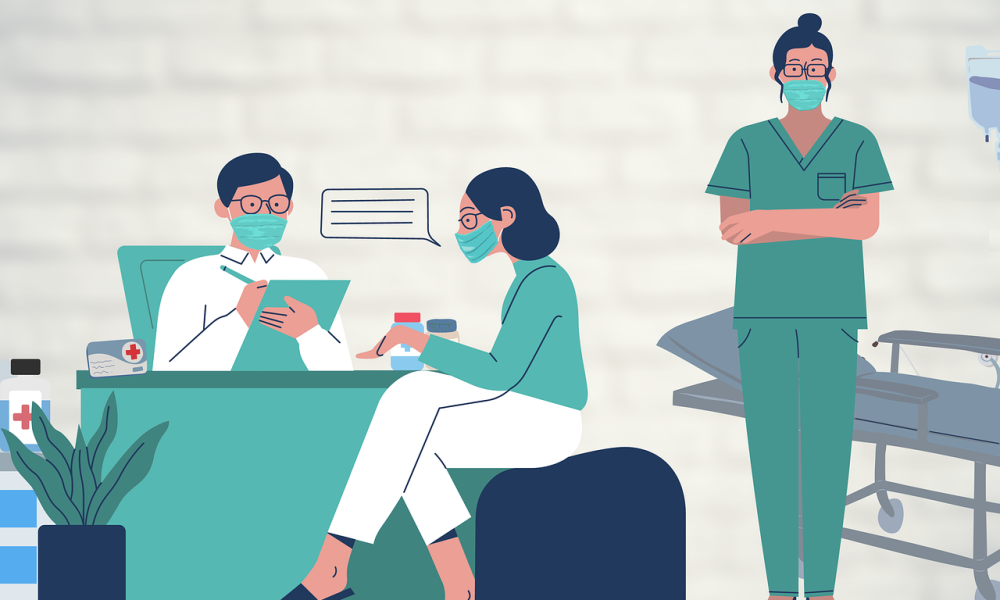Understanding the state of healthcare women currently receive
“According to Marya L. Shegog, a public health expert—Seventy-two percent of women say they’ve experienced medical gaslighting. —Seventeen percent of women say they have been ignored, “dismissed,” or felt like they had to “prove” their symptoms to doctors.”
Consider this: you’re sitting in a doctor’s office, discussing a chronic and painful medical condition you have and the treatment options with your doctor, only to feel as if they’re not listening to you. Like the information goes into one ear and out the other. Then you’re told that there are no other treatment options. You later find out that due to lack of funding, there is only a little bit of research done on your condition. This is true for many women not only across the country but around the world.
Women’s health care has been overlooked and ignored for decades. Women are frequently subjected to medical gaslighting by people whose job it is to assist them. Medical gaslighting occurs when a doctor or other health care provider blames a patient’s symptoms on psychological factors or completely denies the patient’s illness. In terms of healthcare funding and support, women’s health is overlooked. It was discovered that in nearly three-quarters of the cases where a disease primarily affects one gender, the funding pattern favors men according to the article,” Gender Disparity in the Funding of Diseases by the U.S. National Institutes of Health”, The disease either affects more women and is underfunded, or the disease affects more men and is overfunded. Today, we strive for gender equality because it is unethical and morally wrong for one gender to be treated better than the other. No one should have to suffer or, sadly, die because they were not believed or supported.
Of course decades and decades ago society and how genders are treated were different from how they are now mainly in the United States. Women were often seen as lesser in every aspect and had higher expectations in everyone’s eyes. This created many mindsets that women are more emotional and dramatic. This has led to many cases where women in pain or suffering were denied treatment or ignored by their doctors, again solely because of their gender. So in today’s society, you would think something of the sort, but actually, it still happens. The TODAY and SurveyMonkey poll from 2019 found that 17% of women felt they had been treated differently at the doctor’s office because of their gender compared to only 6% of men.” The same survey shows, more than a quarter of women with chronic health conditions said a healthcare provider ignored or dismissed their symptoms. One-third of them said they felt like they needed to “prove” their symptoms to a healthcare provider. This is quite appalling that these many women were being dismissed or ignored. Though all genders do go through pain women often do experience a lot of internal pain. Internal pain often is a medical condition that can severely damage organs and later affects their function.
There is quite a lack of funding/support for women’s healthcare. This has been happening for years, but specifically, the root of it all is women’s health research. There is very little research for certain medical conditions women face and even with good research often the medical issues women have to face go under the radar. The article, “The Impact Of Excluding Women In Healthcare Research”, states, “A funding analysis by the U.S. National Institutes of Health (NIH) showed that research funding was disproportionately allocated to male-led studies at the expense of those that affect primarily women. Medical information and treatments have come a long way with proper research. The fact that funds for research are allocated mainly o male-led studies is alarming nowadays. It is an effect of why many medical conditions that do affect women at a later stage than men often are missed.
Other people frequently say or point out that the US government invests a lot in women’s healthcare, which is currently around 4.6 billion US dollars. They also claim that most healthcare professionals do not treat patients with their personal beliefs or biases. Yes, the United States invests heavily in women’s healthcare, but women’s healthcare research is underfunded. This means that when it comes to medical cases that affect women more or are only related to women, they go unnoticed or provide fewer treatment options than they could. Some examples of this are endometriosis and PCOS. Endometriosis is a disease in which tissue similar to the lining of the uterus grows outside the uterus. It can cause severe pain. PCOS(Polycystic ovary syndrome) causes irregular or long-lasting periods and cysts begging to form on the ovaries. This can be extremely painful and surgery is often the treatment choice to remove the cysts. Furthermore, because women have lower incomes than men and use more medical services, the high cost of care has a greater impact on them. Because of their reproductive healthcare needs and longer life expectancies, they are more likely to face financial and access barriers. Numerous laws across the country prohibit doctors from refusing to treat patients based on their own beliefs, and this affects everyone, not just women.
We live in a new era in which equality is important. Nobody should have to suffer through medical problems because of a lack of support and being ignored. These problems are not limited to women alone. When it comes to race, religion, and so on, it goes so much further. Would you want your mother, sister, extended family, and friends to deal with these issues? That is why you should fight for a better system and report if you or someone else is being ignored. It makes a huge difference.






